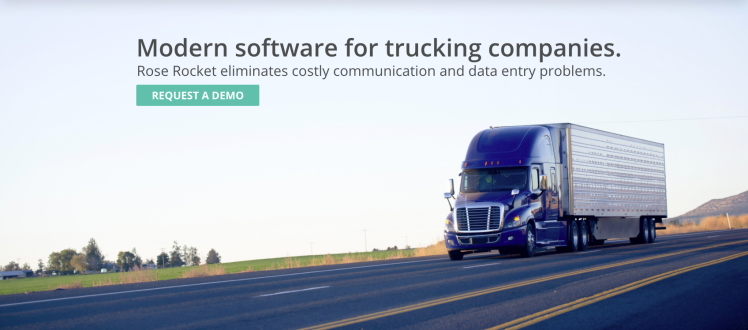According to the American Trucking Association, nearly 70 percent of all freight tonnage moved around the U.S. is transported by trucks. There’s more than $603 billion in revenue coming from trucking — making it a pretty valuable market — and some are looking for modernized tools and software to help maximize returns.
Rose Rocket is one such company and is targeting the “less than truckload” (LTL) carriers. The service gets trucking companies onto the internet, giving them an app to manage operations and orders, while providing a means for drivers to be more efficient on the road. The company currently operates in the U.S. and Canada and says that it eliminates costly data entry and improves communication within carriers, thereby growing profit margins by 25 percent.
For cofounder Justin Bailie, finding solutions to trucking problems is personal. He spent the past decade working in the field, and, while at an international trucking company, witnessed opportunities for improvement first-hand. Before Rose Rocket, he launched FR8nex, a startup that helped shippers manage trucking companies. When it failed in 2015, he and his other cofounders realized that trucking companies were the ones that needed the most help, and his latest entrepreneurial endeavor was born.
The Y Combinator-backed startup wants to bring more freight visibility to an industry where work is handled in old systems and no coordinated effort exists. Bailie said that Rose Rocket is looking to help not only drivers, but freight companies with hundreds of trucks. It offers carriers an app to manage operations, as well as providing an app for drivers that allows them to communicate more easily with the home office. The customers using these trucking companies also have a web portal from which they can place orders, and which also makes the delivery process more transparent.
As mentioned earlier, Rose Rocket is looking at LTL carriers — companies that transport small freight and rely on “hub and spoke” operations, using local terminals and distribution centers as part of their shipping network. Bailie said that Rose Rocket’s solution will enable these carriers to better manage the process, and noted that his company understands how much money is at stake on a single order.
He highlighted one case in which a customer previously spent more than $1 million employing workers to do data entry but found that with Rose Rocket, those clerical and administrative costs were eliminated, freeing up resources to work on other areas and increasing business profits.
Right now, the company counts 10 carriers as customers. It’s also still figuring out its pricing model, but it’s looking at a $1,500 to $5,000 price range. It doesn’t currently integrate with third-party apps, but Bailie has ambitions to eventually transform Rose Rocket into a logistical platform for trucking companies and to add easy integration with all third-party apps.
“We want to be the baseline for the trucking industry,” he said.
VentureBeat's mission is to be a digital town square for technical decision-makers to gain knowledge about transformative enterprise technology and transact. Learn More



